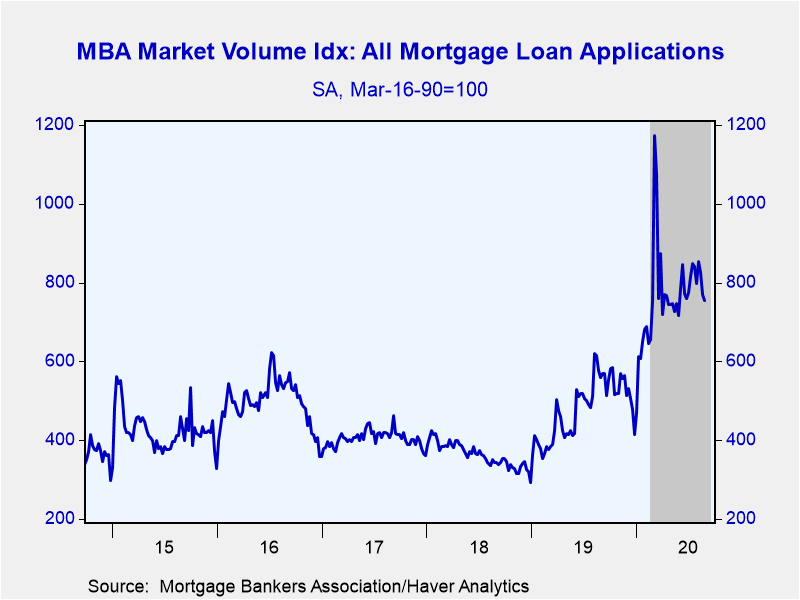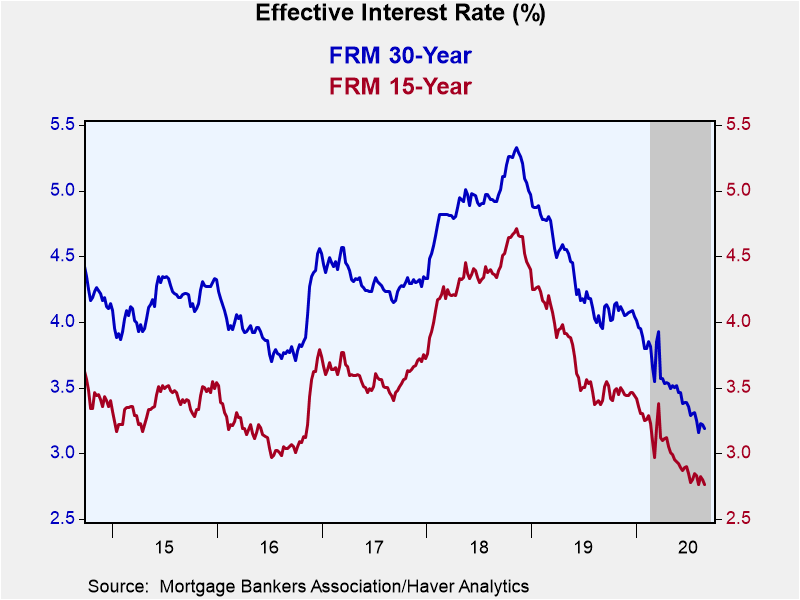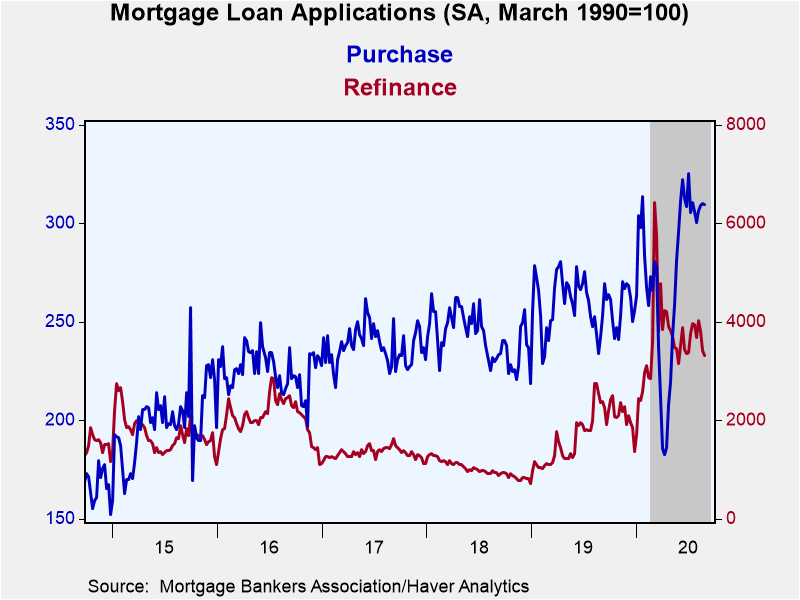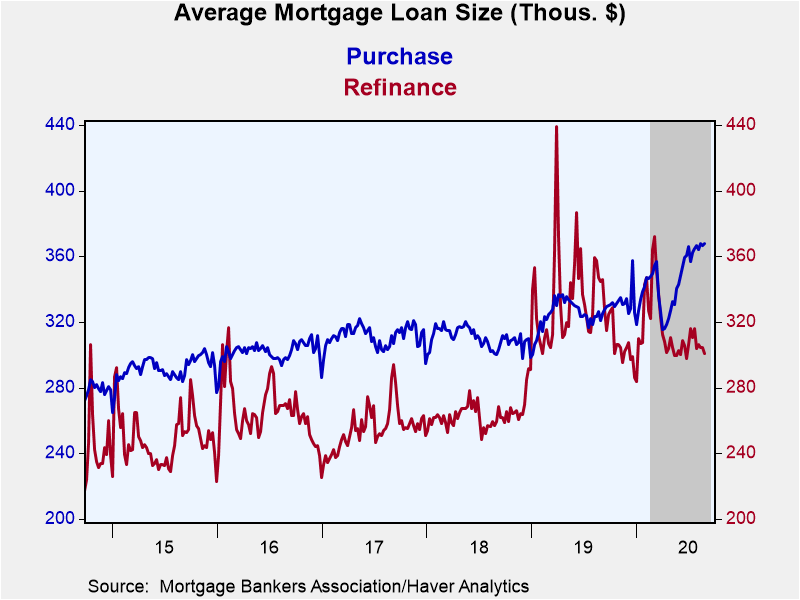 Global| Sep 02 2020
Global| Sep 02 2020Mortgage Loan Applications Fell Even as Rates Declined
by:Sandy Batten
|in:Economy in Brief
Summary
• Applications for both purchase and refinancing loans fell. • The rate on the 30-year fixed-rate mortgage declined and is only 3 basis points above its all-time low reached on August 7. Even though fixed mortgage interest rates fell [...]
• Applications for both purchase and refinancing loans fell.
• The rate on the 30-year fixed-rate mortgage declined and is only 3 basis points above its all-time low reached on August 7.
Even though fixed mortgage interest rates fell to near historical lows, the Mortgage Bankers Association Mortgage Applications Index decreased 2.0% w/w (+35.2% y/y) in the week ended August 28 following a 6.5% w/w drop in the previous week. This was the fifth weekly decline in the past six weeks. Lenders are reporting that demand for home buying continues to come from delayed activity from the spring as well as households seeking more space in less densely populated areas.
Applications for both purchase and refinancing loans fell in the most recent week. Applications for purchase loans edged down 0.2% w/w (+27.6% y/y) in the week ended August 28 versus a 0.4% w/w increase in the previous week. Refinancing applications fell 3.1% w/w (+40.1% y/y) in the most recent week after a 10.2% w/w drop in the previous week. This was the fifth weekly decline for refinancing applications in the past six weeks. The refinance share of mortgage activity decreased to 62.5%t of total applications from 62.6% the previous week. The adjustable-rate mortgage (ARM) share of activity remained unchanged at 2.6% of total applications.
The average mortgage loan size slipped 0.5% w/w to $326,200 in the week ended August 28 from $327,900 the previous week. The average size of a purchase loan rose 0.3% to $368,000 from $366,800 while the average loan to refinance fell 1.1% to $301,100 from $304,600.
Interest rates slipped for the second consecutive week, with the 30-year fixed rate at 3.19% in the August 28 week versus 3.22% the week before, just 3 basis points above its historical low reached in the week of August 7. The rate on 15-year loans fell to 2.76%, returning to its record low, from 2.80% the previous week. After having jumped up 18 basis points to 3.29% in the previous week, the rate on the 5-year adjustable rate mortgage receded to 3.24%
Applications for fixed-rate loans were up 39.6% y/y, while applications for adjustable rate mortgages fell 37.2% y/y.
The survey covers over 75% of all U.S. retail residential mortgage applications and has been conducted weekly since 1990. Respondents include mortgage bankers, commercial banks and thrifts. The base period and value for all indexes is March 16, 1990=100. The figures for weekly mortgage applications and interest rates are available in Haver's SURVEYW database.
| MBA Mortgage Applications (%, SA) | 08/28/20 | 08/21/20 | 08/14/20 | Y/Y | 2019 | 2018 | 2017 |
|---|---|---|---|---|---|---|---|
| Total Market Index | -2.0 | -6.5 | -3.3 | 35.2 | 32.4 | -10.4 | -17.8 |
| Purchase | -0.2 | 0.4 | 0.8 | 27.6 | 6.6 | 2.1 | 5.6 |
| Refinancing | -3.1 | -10.2 | -5.3 | 40.1 | 71.1 | -24.3 | -34.0 |
| 30-Year Effective Mortgage Interest Rate (%) | 3.19 | 3.22 | 3.23 |
4.03 |
4.34 | 4.94 | 4.32 |
Sandy Batten
AuthorMore in Author Profile »Sandy Batten has more than 30 years of experience analyzing industrial economies and financial markets and a wide range of experience across the financial services sector, government, and academia. Before joining Haver Analytics, Sandy was a Vice President and Senior Economist at Citibank; Senior Credit Market Analyst at CDC Investment Management, Managing Director at Bear Stearns, and Executive Director at JPMorgan. In 2008, Sandy was named the most accurate US forecaster by the National Association for Business Economics. He is a member of the New York Forecasters Club, NABE, and the American Economic Association. Prior to his time in the financial services sector, Sandy was a Research Officer at the Federal Reserve Bank of St. Louis, Senior Staff Economist on the President’s Council of Economic Advisors, Deputy Assistant Secretary for Economic Policy at the US Treasury, and Economist at the International Monetary Fund. Sandy has taught economics at St. Louis University, Denison University, and Muskingun College. He has published numerous peer-reviewed articles in a wide range of academic publications. He has a B.A. in economics from the University of Richmond and a M.A. and Ph.D. in economics from The Ohio State University.
More Economy in Brief
 Global| Feb 05 2026
Global| Feb 05 2026Charts of the Week: Balanced Policy, Resilient Data and AI Narratives
by:Andrew Cates










